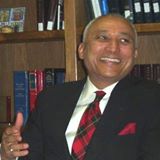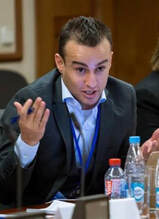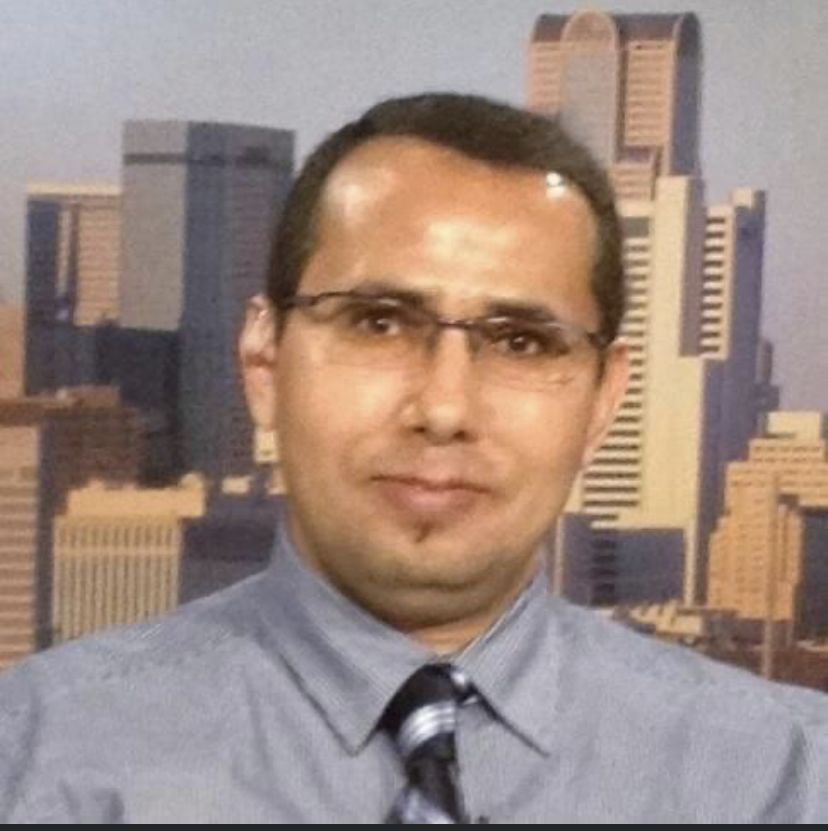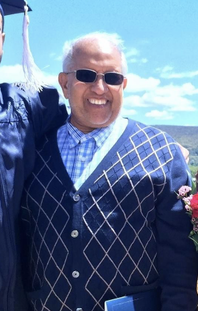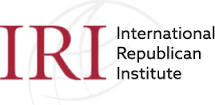بيان صحفي Press Release - 9/22/2020
Expert Libya Team
A. Omar Turbi, Expert International Affairs & Former Advisor, National Transitional Council (NTC-2011)
Mohamed Eljarh, Researcher, Libya Analyst
Ibrahim Hiba, Instructor, International Relations & Comparative Politics
Jude Mohamed Al-Megherbi, Former Deputy Minister of Labor (2012)
Dr. Mohamed Tainaz, Former Deputy Minister of Defense (2012)
Dr. El-Amin El-Huni, Human Rights Activist
Mohamed Eljarh, Researcher, Libya Analyst
Ibrahim Hiba, Instructor, International Relations & Comparative Politics
Jude Mohamed Al-Megherbi, Former Deputy Minister of Labor (2012)
Dr. Mohamed Tainaz, Former Deputy Minister of Defense (2012)
Dr. El-Amin El-Huni, Human Rights Activist
Members of the Expert Team are Libyan professionals who have grave concerns over the Libya crisis - Absence of a constitution, a fractured House of Representatives, lack of legal systems, corrupt ineffective central government, continued presence of rogue militias, persistent interference by foreign powers have all contributed to the "failed state" status of the country. The Libyan people have low confidence in the UNITED NATIONS' so called; Return to the Political Process.
Recommendations provided below to revive and erect a viable Return to the Political Process have TWO DISTICNT and very crucial components - Electoral Process, & Public Deliberative Process. Both processes would be guided and under the auspices of the UNITED NATIONS. They are driven by a Competence Committee made of expert and international Juris Prudence - Judges from across the world, and None Government Organizations (NGO's). The Carter Center for Democracy is one prime example.
The agony, and suffering of the Libyan people have been propagated and prolonged by the DEEP DISTRUST between the current political figures in and between the two governments of western and eastern Libya. Lack of trust is compounded by persistent influence and interference from their respective domestic and foreign allies. A Return to the political process for purposes of retiring current antagonists in and on both sides is paramount. The ultimate goal would be the establishment of a competent EMERGENCY GOVERNMENT.
The EMERGENCY GOVERNMENT would assume its power for 24 months vested in its Presidential Council, its Prime Minister and a cabinet not to exceed 15 ministers. The current House of Representatives (HoR) shall serve to assist in the implementation of the establishment of the proposed EMERGENCY GOVERNMENT. The current HoR’s term shall not expire until a constitution has been fully drafted and a new HoR has been elected, at which time the proposed constitution is ratified by the new HoR.
The Return to the political process proposed below is specifically designed to complement the recommendations in the Berlin Conference on Libya of 1/19/2020. It will be deliberative and constructed to provide high degree of assurances that the emerging EMERGENCY GOVERNMENT is competent, and effective.
It is imperative that a Return to the political process is not rushed. It has to consider and evaluate the root causes of the mistakes committed in the Skhirat agreement, when the Government of National Accord (GNA) was established on December 17th, 2015. Recent success of elections in various municipalities across Libya are positive signs for the reemergence of true democratic processes.
Return to the political process
(25). We support the Libyan Political Agreement as a viable framework for the political solution in Libya. We also call for the establishment of a functioning Presidency Council and the formation of a single, unified, inclusive and effective Libyan government approved by the House of Representatives.
Electoral Process
English only as provided below
English only as provided below
Public Deliberative Process
English is provided blew, and the Arabic version of this process on separate page
English is provided blew, and the Arabic version of this process on separate page
(1). Return to the political process for establishing a competent EMERGENCY GOVERNMENT shall be deliberative; free from tribal influence, regional considerations, or political extremism. It will include televised hearings intended to run every candidate for a Presidential Council, a Prime Minister, and fifteen Minsters through a rigorous, extensive vetting and qualification process. Each and every candidate shall lay out his or her vision and strategic plan on how to serve the Libyan people.
(2). Recommendations of the Berlin Conference on Libya held on January 19th, 2020 and United Nations Security Council resolution 2510 adopted on February 12th, 2020 shall be the guiding principles. The only Libyan legislative body shall be the current House of Representatives.
(3). A DELIBERATIVE DEMOCRATIC process for the Return to the political process for establishing a competent EMERGENCY GOVERNMENT shall be made and owned by the Libyan people under the auspices and professional expert guidance of the United Nations. Power of the new EMERGENCY GOVERNMENT shall be vested in its Presidential Council, Prime Minister and his or her cabinet, and current HoR to restore control over all national institutions. Public perception, and renewed confidence in national leaders will hopefully begin to instill pride and hope in the dreams and aspirations of the Libyan people.
(4). THE DELIBERATIVE DEMOCRATIC process for the Return to the political process for establishing an EMERGENCY GOVERNMENT shall take its course as provided below and in a maximum of 90 days from the start date of the process. It will be subject to (4) (a), and (b) below:
(a). The United Nations Security Council shall create a 15 member Competence Committee. It shall be called the Competence Committee hereinafter referred to as (the “CC”). The CC shall be made up of 5 Arab and African members, 5 western members; American and European, and 5 Asian and Latin American members. The CC membership shall be of highly experienced juris prudence judges in international law from the respective countries. The CC shall work closely with expert None Government Organizations (NGO’s) as defined below in (4) (b) and shall construct a vetting and qualification process of political candidates. The CC shall have the following responsibilities:
|
(i). The CC shall have the fiduciary responsibility to carry out its duties with the highest integrity and in the best interest of the Libyan people. It will render its decisions in accordance with international law. It shall perform its evaluation, public hearings, vetting, and qualifications of political candidates in the best possible manner.
(ii). The CC shall provide monthly reports on its progress to the United Nations Security Council and UNSMIL (UN Special Mission in Libya).
|
(b). The United Nations Security Council shall evaluate and appoint 7 or the required number of expert (NGO’s) from the United States, Canada, Europe, and other countries. Such NGO’s must be prominent and possess excellent skills in nation building, the construction and reconstruction of government institutions as described below:
|
(i). NGO’s must possess experience in intercultural electoral and election processes with particular emphasis on cultures similar to the Libyan one. The NGO shall work closely with members of HoR from the three Libya regions; Barga (eastern region), Fazan (southern regions), and Tripoli (western region) in all aspects of the Return to the political process:
|
|
(a). Help select 13 qualified members of HoR from each of the three Libya regions through drafting a criteria for most representative, and most effective members for the Return to the political process.
(b). Assist in drafting a description of the job responsibilities of the political post candidates such as Presidential Council member, Prime Minister, and Cabinet Ministers.
(c). Assist in drafting TV and newspaper ads invitations for political post candidates such as Presidential Council member, Prime Minister, and Cabinet Ministers.
(d). Assist in drafting a criteria for reference checks and qualifications of the candidates.
(e). The NGO’s shall help design the question and answer sessions throughout the selection of political candidates.
(f). The NGO’s shall work together, compare tasks to draft a 24, 36, and 48 months projections and goals. Measurements are Evidence Based, and Performance Improvement.
|
|
(ii). NGO’s must possess a special skill set in the construction of constitutions, and design of proper framework in ratifying a constitution, working with legislative, and executive branches of government.
(iii). NGO’s must possess special skills in financial institutions, and banking systems.
(iv). NGO’s shall possess skills in reconstruction of ministries and municipalities, and electronic government.
(v). NGO’s shall possess skills in legal systems, civil law suits, arbitration, and contracts.
|
(c). The commencement of the Return to the political process for the establishment of the EMERGENCY GOVERNMENT shall be synchronized with BOTH the time the CC has been fully formed and the evaluation, selection and appointment of the NGO’s described above. Synchronization of these bodies is mandatory to provide the maximum contribution by such NGO’s to carry out the processes and mechanism for the ultimate establishment of a competent and effective EMERGENCY GOVERNMENT.
(5). Under the auspices of the United Nations and expert guidance and NGO’s, each of the three Libya regions – Barga (eastern region), Fazzan (southern regions), and Tripoli (western region) shall form a 13 member body consisting of members of the House of Representatives (only elected members) representing each region. Care by the United Nations and the NGO’s should be taken to ensure acceptable representation of each region. Engaging representatives from local municipalities to endorse political candidates may serve to complement each regional House of Representatives candidates nomination process. Perhaps one of the criteria is the selection of those House of Representatives that received the highest number of votes from their respective districts and the population that voted them in from the first place. The 13 member committees of each region, and the UN assigned NGO’s shall conduct the following:
(a). Each regional committee shall draft an invitation announcement with assistance from the United Nations and respective NGO for interested Presidential Council (PC) candidate. Such invitation announcement will describe the responsibilities duties of the office of the Presidential Council member. The Presidential Council member candidate shall submit a 2000 word vision and a strategic plan on how to govern. The invitation will air on television and be placed in local newspapers. The invitation announcement and the newspaper ads must run on a daily basis for two weeks and renewable for one week each time until a minimum of 6 and a maximum of 9 candidates submissions have been received.
(b). Each regional committee shall conduct a 3 to 5 day televised public hearings of the candidates where each of the candidates will make a public presentation on his or her vision and how to govern and be subject to question and answer by members of the committee. At the end of the hearings, each regional committee shall vote on the candidates in a secret ballet for three out of the 6 or 9 candidates. Each regional committee shall end up with three candidates. The oral presentations by each candidate must not exceed 15 to 20 minutes, and a maximum of five minutes for each answer to any question in the question and answer sessions. (An NGO shall help draft hearings plan for time management and rebuttal ).
(c). The (CC) working with the respective NGO shall design and conduct televised hearings for the final 9 Presidential Council (PC) candidates, 3 from each region and hold a secret ballet vote on a final 6 nominations, 2 from each region. Upon selection of the nomination of six presidential council candidates by the CC, the three regional committees consisting of a total of 39 House of Representatives convene and vote to ratify and confirm through a secret ballet for a president, and two Vice Presidents of the newly formed presidential council.
(d). The United Nations and expert guidance, the CC and the NGO’s shall continue to monitor the progress of the three regional House of Representatives committees in the selection and ratification of the three Presidential Council members, Prime Minster, and the fifteen ministers.
(e). With the assistance from the United Nations and NGO’s, the three regional committees shall draft a description of the mandate, responsibilities, and duties of each member of the presidential council - below are some recommendations subject to change and modification:
|
(i). The President of the Presidential Council (PC) shall be the national figure head of the country, promote unity between the three historical Libya regions. He shall hold the post for 6 months. The three members of the Presidential Council (PC) shall rotate the position of President every 6 months starting with the President, then one of the two Vice Presidents.
(ii). The Presidential Council (PC), and the head of the House of Representatives shall draft the scope of duties and responsibilities of the working relationship between the Presidential Council (PC) and the Prime Minister and that between the Presidential Council (PC) and the House of Representatives.
(iii). The Presidential Council (PC), the Prime Minster and head of the House of Representatives shall have oversight over two of the four sovereign and key ministries; the Ministry of Foreign Affairs, and Ministry of Defense. Additional oversight responsibilities include, political, and defense relative to international treaties with other nations, appointment of the heads of the security agencies, nominations and review of nominations of Ambassadors by minister of foreign affairs, and other matters related to Libyan national security interests. Such oversight by the five members shall seek ratification by the current and future House of Representatives.
(iv). President, and the two Vice Presidents of the Presidential Council (PC) each one shall have the right to nominate one prime minster candidate and one none sovereign none key minister for evaluation by the CC and eventual ratification by the House of Representatives. Each member of the Presidential Council (PC) shall work closely with his own regional committee and follow the invitation and announcement format in (5) (a) above and assist in the nomination of one prime minster candidates for the respective region.
(v). President, and the two Vice Presidents of the Presidential Council (PC) shall be available to break a majority tie vote if and when the three regional committees require and fall short of two third majority when ratifying and confirming a sovereign and key ministerial post, or a proposed constitution or a constitutional amendment. In the event a majority vote is not achieved, then the head and president of the House of Representatives shall cast his vote. Sovereign and key ministerial post are Minister of Defense, Minister of Interior, Minister of Foreign Affairs, and Minister of Finance. The majority vote is a total of 26 votes.
(vi). President, and the two Vice Presidents of the Presidential Council (PC) will be observers on the constitution drafting committee. Each member of the PC shall have the right to vote on the constitution drafting process.
(vii). President, and the two Vice Presidents of the Presidential Council (PC) shall work together to construct a strategic plan to disarm armed militias, unite national security apparatus, training programs, and the unification of the national army. The Council shall strengthen formal military institutions and police as without security, democracy, governance and development is impossible. Promote the establishment of watch dog organizations over corruption, transparency, accountability, and international business agreements, This Presidential Council shall work closely with the newly elected Prime Minister, minsters of Interior, Defense and Foreign Affairs. The strategic plan will have to be ratified by the House of representatives. A minimum number present of the House of Representatives must be 39. A majority vote is 20 which shall be modified when a new House of Representatives is born.
(viii). President, and the two Vice Presidents of the Presidential Council (PC) shall work together to construct a plan and be responsible for educational programs for the preparations and set up of local upcoming regional legislative elections. Each Presidential Council member shall work with United Nations assigned NGO’s.
(ix). President, and the two Vice Presidents of the Presidential Council (PC) shall cooperate and promote exchange of information between educational institutions, universities and colleges of the three regions for ultimate harmony for national unity.
|
(6). Upon completion of the selection ratification and confirmation of the three Presidential Council (PC) members and the confirmation of President, and the two Vice Presidents of the Presidential Council (PC) by the three regional committees of the House of Representatives each Presidential Council (PC) member shall convene his respective regional House of Representatives committee and conduct the following:
(a). Each member of the Presidential Council (PC) shall nominate one prime minister candidate, and request that his regional House of Representatives committee nominate one additional prime minister candidate through the same process conducted in (5) (a), (b), and (c). The selection process requires that the regional House of Representatives committee evaluate a minimum of 3 prime minister candidate and a maximum of 6. It shall run through the same propose Competence Committee (CC) for the final selection of one prime minister who would be up for confirmation and ratification by the three regional committees consisting of a total of 39 House of Representatives.
(b). Upon final selection of the prime minister, confirmation and ratification by three regional committees consisting of a total of 39 House of Representatives, the Prime Minister is requested to appoint three Deputy Prime Ministers from each of the three regions who will not be subject to the CC vetting process, but must be approved by the Presidential Council in a minimum vote of two members of the Presidential Council. The Prime Minster is also requested to nominate 12 minsters cabinet for a total of 15 minister cabinet 3 of which would have been nominated by the three Presidential Council, one from each member. The Prime Minister shall be required to nominate 4 minsters from each of the three regions. The right of each Presidential Council member for the nomination is subject to (5) (e) (iv). Appointment of key and sovereign minsters in (7).
(c). Each nominated minster candidate for each ministry shall stand before the CC for a public hearing and then stand for a public hearing before the three regional committee consisting of a total of 39 House of Representatives in a televised public hearing. The minster candidate will make a public presentation on his or her vision and on how to govern and be subject to question and answer by members of the three regional committees consisting of a total of 39 House of Representatives. The hearing will follow the same presentation format and question and answer proposed in (5) (b). In the event the minister candidate is not selected by either the CC or the three regional committees consisting of a total of 39 House of Representatives, either the CC or the three regional committees consisting of a total of 39 House of Representatives or both shall request a new nomination from either the respective Presidential Council member or the Prime Minister. If the confirmation hearing is for a nomination from a Presidential Council member, then the request from the committee or the CC shall be made to such member, if not then the Prime Minster shall submit a new minster candidate. The presentation by minster candidate must not exceed 15 to 20 minutes, and a maximum of five minutes for each question in the question and answer session. (An NGO shall help draft hearings plan for time management and rebuttal ).
(7). Confirmation and ratification process for key and sovereign minsters. The position of minsters of Defense, Interior, Foreign Affairs and Finance are very critical for the sovereignty of the country, its security and economic stability. Such posts must be carefully evaluated, vetted, selected, confirmed and ratified by a minimum of two thirds of the votes by the three regional committees consisting of a total of 39 House of Representatives. The majority vote shall be 26 votes and subject to (5) (e) (v):
President, and the two Vice Presidents of the Presidential Council (PC) shall be available to break majority tie vote if and when the three regional committees require and fall short of two third majority when ratifying and confirming a sovereign and key ministerial post, a proposed constitution or a constitutional amendment. Sovereign and key ministerial post are Minister of Defense, Minister of Interior, Minister of Foreign Affairs, and Minister of Finance. The majority vote is a total of 26 votes. It shall be modified when a new House of Representatives is born.
(a). No more than two of such posts shall be from one region. The Minster of Foreign Affairs, and Minister of Interior must be from two different regions.
(b). Each minster must have extensive experience in their respective responsibilities, speak one foreign language fluently preferably English.
(c). The candidate for Minster of Foreign Affairs must be very fluent in the English language.
Conclusion
It is very important to recognize that no peace, stability or resolution to the short and long term Libya crisis without a DELIBERATIVE DEMOCRATIC process outlined herein for the emergence of a competent EMERGENCY GOVERNMENT. The Return to the political process provided is deliberate, and intended to run every candidate through a rigorous and and extensive vetting and qualification process. Each and every candidate shall on his or her own initiative present himself or herself to be of service to the Libyan Nation, and its people. The shear exercise of being subjected to public and televised hearings is designed to hold each candidate to be responsible to the people.
Our hope the very DELIBERATIVE process will create enthusiasm, and encourage more participation by qualified candidates. When it is implemented at any stage of the Libyan political process, it should help establish a new legislative body, a permeant government, and institutions who’s members are free from tribal influence, regional considerations and political extremism. Each member of such body would be honorable, possesses a high degree of integrity, work ethics, and excellent qualifications.
Biographies of the expert team
|
A Omar Turbi
Expert, International Affairs & Former Advisor, National Transitional Council (NTC) (2011) Omar Turbi recognized for lobbying and credited for persuading the United States to take part in NATO operations during the February 17th, 2011 revolution. Served as an advisor to the National Transitional Council (NTC) during the first eights months of the revolution, and diligently provided humanitarian and assistance.
|
He relentlessly lobbied the U.S and EU governments for intervention to save Libyan civilians, and remove the Qaddafi regime. He aggressively promoted the recognition of the interim National Transitional Council (NTC) as the legitimate representative of the Libyan people.
Turbi is a distinguished Arab American, recognized for his support for democratic institutions and Arab causes in the U.S. He is a member of the National Advisory Board of American-Arab Anti Discrimination Committee, (AADC), a Chairman Emeritus of the Arab American Republican Club. He served on the board of Trustees of the World Affairs Council of America. Turbi, is a prominent human rights activist with a keen interest in Libyan, Arab and western affairs. A founding member of the Libyan Human Rights Commission. The Commission gained prominence when It delivered the 1st ever, intervention speech in the history of the United Nations Human Rights Committee in Geneva, Switzerland in February, 1989. The Commission helped secure political asylum for hundreds of Libyans in Western Europe throughout the nineties.
Turbi promoted constructive engagement between the U.S and Libyan governments and delivered testimonies to the U.S Congress. He participated and helped arrange countless educational and exchange missions between United States institutions and Libya. He holds an engineering degree in power systems (BSEE) from the University of Wisconsin. His post graduate work is in business and international relations. He worked for IBM, and later Motorola. He became highly proficient in Six Sigma Quality Management Systems. He is a frequents commentator on CNNi, BBC, Al-Jazeera and other TV networks on Libya.
Bio in Arabic
|
Mohamed Eljarh
Researcher & Libya Analyst Mohamed Eljarh is a Libyan affairs specialist. He is the co-founder of Libya Outlook for Research and Consulting. Previously, he was a fellow with the Atlantic Council focusing on Libya, and he was Foreign Policy Magazine's Libya contributor 2014-2017. He published two book chapters and numerous Think Tank reports and policy briefs on post-Qaddafi Libya. Eljarh is a contributor to Fikra Forum.
|
|
Ibrahim Hiba
Libya Analyst (Doctorate Candidate, Comparative Politics & International Relations - University of North Texas) Hiba is one of the foremost authority in the known historical Libya region of Fazzan. He contributed to over 70 live television programs on current Libya crisis. His focus is ethnic Peace and Ethnic conflict, with keen interest in Government Performance and Comparative Politics, and International Relations.
|
(Middle East, North Africa, and Sub Saharan African Countries). Trans border ethnic peace and ethnic conflict, Regional conflict, Conflict management Democratization, Consociational Democracies, Political Stability, and The Quality of Government Performance), and Quantitative Research Methods.
Hiba’s publications include:
Ishiyama, John, Hiba, Ibrahim. “Rethinking the Relationship between Inclusive Institutions and Political Violence” Nationalism and Ethnic Politics: 2020.
Hiba, Ibrahim 2016. "Consociational Democracies, Political Stability and External Intervention." The Libyan Organization Of Public Policies & Strategies (LOOPS)
Hiba, Ibrahim. 2008. "The Political Rectification in the Arab Countries in the Shadow of the International Stage." Academy of Postgraduate Studies- Tripoli-Libya:1–222. Ibrahim Hiba is a member of American Political Science Association.
eMail: [email protected]
|
Dr. Amin El-Huni, founding member of the Libyan Human Rights Commission. He served as director of Arab Affairs at Libyan Human Rights Commission from 1985 to 1999. Assisted hundreds of Libyans across Europe secure political asylum in Switzerland, Holland, the UK, Canada and Australia. Dr. El-Huni is a founding member of the National Front for the Salvation of Libya. He practices dentistry in Philadelphia, Pennsylvania. El-Huni comes from a prominent Libyan family with deep roots in the Right To Freedom of speech and Expression. Al-Haqiqa Newspaper was published in Benghazi a daily paper his family helped establish in the early 1950’s.
|
The following two PDF documents are provided for convenience
Electoral Process - English only
Public Deliberative Process - The Arabic version
| ||||||||||
